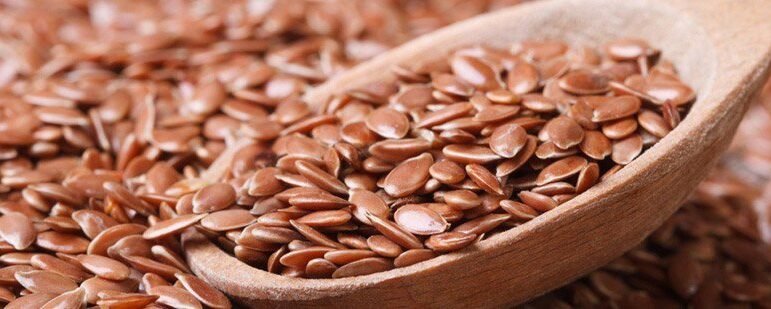Flax Seeds

Flax seed extract is a genus of approximately 200 spicies in the flowering plant family Linaceae. They are native to temperate and subtropical regions of the word. The genus includes the common flax (L. usitatissimum), the best fibre of which is used to produce linen and the seeds to produce linseed oil.
Flax is grown both for its seeds and for its fiber.
Flax is an erect annual plant growing to 1.2 m (3 ft 11 in) tall, with slender stems. The leaves are glaucous green, slender lanceolate, 20–40 mm long and 3 mm broad. The flowers are pure pale blue, 15–25 mm diameter, with five petals; they can also be bright red.
The fruit is a round, dry capsule 5–9 mm diameter, containing several glossy brown seeds shaped like an apple pip, 4–7 mm long.In addition to referring to the plant itself, the word “flax” may refer to the unspun fibres of the flax plant.
Cullinary Uses:
Flax seed is used for industrial applications, with two of the more common products being Linseed oil and Linoleum.
Flax seed is the source of linseed oil, which is used as an edible oil, nutritional supplement, Animal feed and as an ingredient in many wood finishing products Flax seed oil is an important ingredient in paints, varnishes, and linoleum.
Various parts of the plant have been used to make fabric, dye, paper, medicines, fishing nets, hair gels, cloths, ropes and soap.
Medicinal Uses:
Flax seeds are used for treating asthma, osteoarthritis, rheumatoid arthritis, migraine headaches and osteoporosis.
Flax seeds have high levels of lignans which protect against breast cancer.
Flax Seeds improves the quality of hair, nails, and skin, as well as helps to lose weight or bulk up.
Flax seeds lowers cholesterol, blood pressure and prevents arthritis and cancers.
Standard grades of Flax Seeds available with us are as follows:
| Specifiaction of Flax Seeds | |||
|---|---|---|---|
| Product Name | Flax Seed | Botanical Source | Linum usitatissmum L. |
| Item | Specification | Test Method |
|---|---|---|
| Maker Compounds | Lignans(as SDG) 20% | HPLC |
| Organoleptic | ||
| Appearance | Fine Powder | Visual |
| Color | Yellowish | Visual |
| Odor | Characteristic | Organoleptic |
| Taste | Characteristic | |
| Part Used | Seeds | |
| Physical Characteristics | ||
| Particle Size | NLT100%Through 80 mesh | CP2010-appendiXIB |
| Loss on Drying | NMT5.0% | CP2010-appendiIXG |
| Bulk Density | 40-60g/100ml | CP2010 |
| Heavy metals | ||
| Total Heavy Metals | NMT20ppm | CP2010-appendixIXE |
| Arsenic | NMT2ppm | CP2010-appendixIXB |
| Lead | NMT2ppm | CP2010-appendixIXB |
| Cd | NMT1ppm | CP2010-appendixIXB |
| Hg | NMT0.5ppm | CP2010-appendixIXB |
| Microbiological Tests |
Container Capacity:
Approximately 19 MT per 20 feet container for flax seeds.
Why Flax Seeds From Kinal Global Care Private Limited?
- Transparent Written and Oral Communication about the product.
- Customer focused rather than sales focused.
- Experience of Shipping to almost 16 countries.
- Customers feedback for each shipment.
- Stringent Sourcing and Quality checking.
- Live Videos and Photos while processing.
- Willingness to help without any sales expectation.
- Direct Personal Involvement of Management in each shipment.
How To Select A Genuine Exporter Of Flax Seeds ?
- Understand Exporter’s Company and the Industry.
- Understand the Exporter’s Presence and experience.
- Knowledge, Quality and Source of the Product.
- Pricing of the Product.
- Willingness to help without any sales expectation.
- Video Calling/Physical Visit.
- Verification in Google about the complaints.
- Tradeshow Participation.
Export Analysis of Flax Seeds
India exported flax seeds worth USD 19,786,617 with total quantity of 18,412,131. Netherlands is the largest buyer of flax seeds accounting for exports worth USD 6,252,531 followed by Germany and United States which imported flax seeds worth USD 5,702,802 and USD 3,153,309 respectively.
The countries which are importing Flax Seeds from India are:
 Netherlands
Netherlands United States
United States Australia
Australia Canada
Canada Italy
Italy UK
UK Belgium
Belgium UAE
UAE Austria
Austria